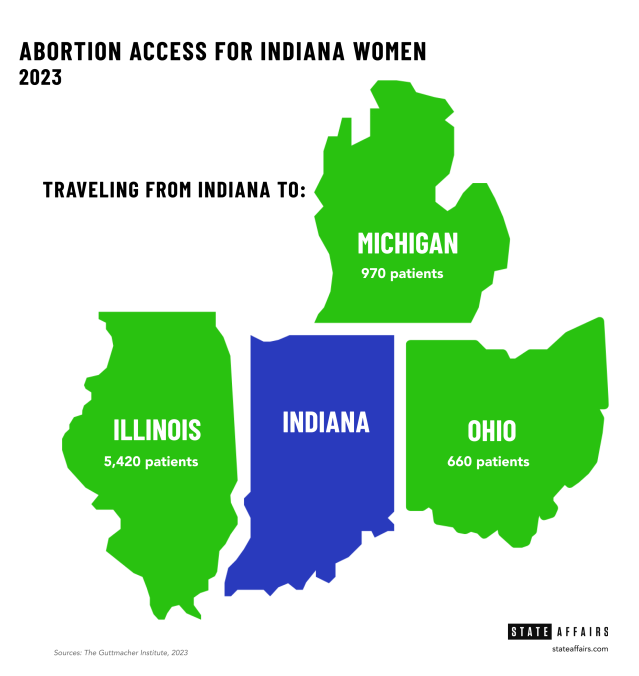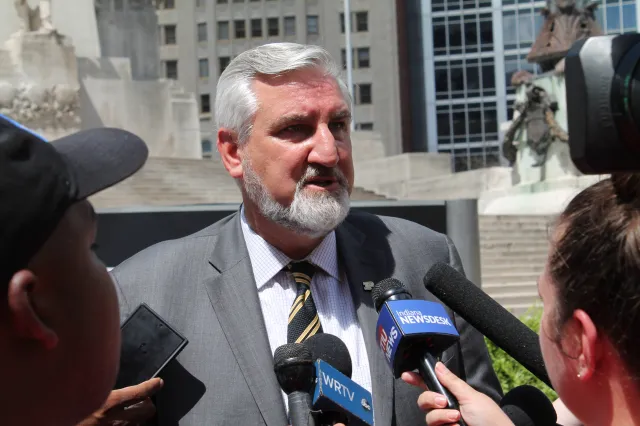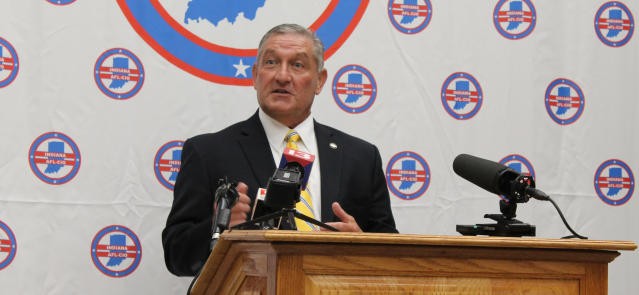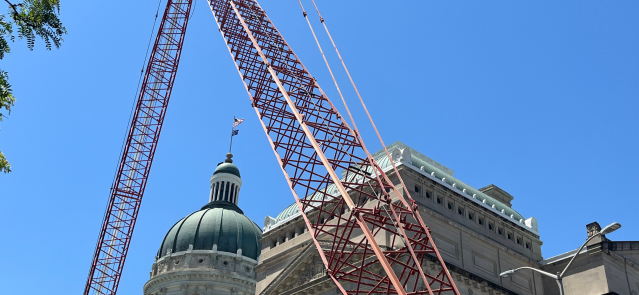Stay ahead of the curve as a political insider with deep policy analysis, daily briefings and policy-shaping tools.
Request a DemoWith Indiana ban in place, thousands seek abortions in neighboring states

The view from a vehicle at sunset on the highway. (Credit: Taras Makarenko)
- Thousands have traveled to neighboring states to seek abortions following Indiana’s ban
- The number of abortion providers and advocates in Illinois has grown as out-of-state patients have increased
- Anti-abortion organizations say the ban is working as intended
After a traumatic first pregnancy that culminated in a hospital stay for both herself and her twin daughters in 2013, Sarah did not intend to have more children. She took precautions.
They weren’t enough.
Sarah, whose name State Affairs has changed to protect her identity, learned of her second pregnancy after she became ill in 2019. Her copper IUD had dislodged and was no longer providing birth control.
“I was so scared, and I was quite unwell,” she said. “I could not drive myself to work because I was having blurred vision. I couldn’t imagine having to go through something like that for nine months — and to not be able to take care of my children.”
Missing work for a long period was not an option, as Sarah is the sole breadwinner for her Carmel-based family. She decided to have an abortion.
Her local gynecologist was not allowed to perform the procedure due to Indiana restrictions. The state’s abortion clinics had no available appointments, and she was too early in the pregnancy to have the procedure in neighboring Illinois.
Sarah ended up flying to California, where her mother lives, for an abortion. She recovered from the surgical procedure while on a plane back to Indiana.
Traveling out of state for abortions has become a more frequent reality for Indiana women.
Monday marked the second anniversary of the U.S. Supreme Court’s reversal of Roe v. Wade, which had provided federal protections for abortion. Indiana soon became the first state to enact a near-total ban on the procedure, which went into effect in August 2023.
Since then, thousands of Hoosiers have left the state for abortions, according to new data. Hurdles have been placed in front of access to the procedure, both for Indiana women and the organizations that provide or assist with abortions.
Abortion opponents in the state have welcomed the new reality, saying Indiana is now a haven for protecting unborn children.
“Because of Indiana’s leadership in the Midwest as a community that supports pregnant moms and protects unborn babies, we are seeing the abortion rate greatly reduced,”
Indiana Right to Life President Mike Fichter said in a statement to State Affairs.
Fichter said the law in Indiana keeps it from becoming an “abortion-destination state.”
But Sarah is concerned about the realities that women with fewer options than she had now face — and what the future holds for her two preteen daughters.
“I’m just afraid of what could happen to [my daughters] if they became pregnant and felt they couldn’t tell me,” she said. “I don’t want them to have to go through this.”
Where are Hoosiers going to seek abortions?
As Indiana’s ban went into effect, neighboring states saw an influx of Hoosier patients.
In 2023, more than 7,000 Hoosiers received abortions in Illinois, Ohio and Michigan, according to data compiled by the Guttmacher Institute, a pro-abortion policy and research organization.

Most of those — 5,420 — occurred in Illinois, where abortions are legal until around 24 weeks into the pregnancy. Illinois also does not require parental permission for minors seeking an abortion or mandate a waiting or counseling period before performing the procedure.
In Indiana, 3,570 abortions were performed on local patients — almost all of which occurred before the ban took effect in August.
The number of abortions performed in Indiana has drastically dropped in 2024, according to statistics kept by the Indiana Department of Health. In the first four months of 2024, 45 pregnancies were terminated — down from 1,931 and 2,286 during the same periods in 2023 and 2022, respectively.
Now, abortions are allowed in Indiana only if the pregnancy presents a serious health risk to the mother.
According to the Center for American Progress, the average drive time for Hoosiers seeking an abortion is now 1 hour and 44 minutes, up from 42 minutes in August 2021.
Neighboring Planned Parenthood expands
Planned Parenthood’s 11 Indiana locations remain open. Although they no longer perform abortions, the facilities still provide cancer screenings, tests for sexually transmitted diseases and other medical procedures, said Rebecca Gibron, CEO of Planned Parenthood’s regional affiliate that includes Indiana.
“For more than 67% of the patients we care for, we are their only form of health care,” Gibron said. “Unlike the extreme politicians and lawmakers in Indiana, we are not turning our backs on our patients.”
Caucus leadership from the Republican-led Indiana General Assembly declined to comment for this story.
Indiana’s Planned Parenthood locations are also working to refer patients seeking abortions to health centers in other states, some of which have expanded to accommodate the influx of out-of-state visitors.
Planned Parenthood of Illinois hired more staff and strengthened its operations in anticipation of the influx of out-of-town abortion seekers, said Julie Uhal, safe abortion expansion coordinator. That included expanding its Champaign clinic near the Indiana border.
“There are tens of thousands, if not hundreds of thousands, of people who are health care refugees, for lack of a better word,” Uhal said. “They are being forced by their state governments to travel out of state to access health care.”
Bans such as Indiana’s don’t necessarily stop people from having abortions; they simply make the process costlier, Uhal said. That disproportionately affects people of color, those living in rural areas, younger patients and those with low incomes.
Planned Parenthood also works with abortion fund organizations and provides some of its own money to cover travel costs and other expenses for some patients.
That increase in cost is not necessarily sustainable for Planned Parenthood, Uhal said, as donations have slowed as fervor over the Supreme Court’s Roe decision has dissipated.
Abortion funds, providers adjust
Megan Jeyifo, executive director of the Chicago Abortion Fund, agreed that costs are beginning to mount. Her organization has grown from supporting fewer than 200 people in all of 2018 to 200-300 requests per week.
The fund provides money for travel, child care, hotel stays and other expenses to anyone seeking an abortion in Illinois, including Hoosiers.
Abortion costs vary depending on the procedure performed and the stage of the pregnancy. According to the Kaiser Family Foundation, the average national cost is $500 at 10 weeks gestation and $1,195 at 20 weeks.
Jeyifo said the majority of patients seeking abortions are already parents, so those traveling from Indiana and other states have to make accommodation arrangements for their families.
Families in which the mother cannot get a wanted abortion are more likely to experience poverty, debt, economic insecurity and eviction, Jeyifo said.
Dr. Allison Cowett is an OB-GYN at Family Planning Associates, Illinois’ largest independent abortion clinic, located in downtown Chicago.
Due to her clinic’s close proximity to northwest Indiana, about 10% of its patients came from Indiana prior to the abortion ban because of more relaxed restrictions, lower costs and better appointment availability.
After Indiana banned abortions, that percentage increased to about 15% of the more than 1,000 monthly patients seen by Family Planning Associates.
Cowett said requiring patients to travel has added to their anxiety and trauma, in addition to the financial burden.
Some patients, Cowett said, seek an abortion for financial reasons, such as needing to finish school or being unable to care for a newborn. Others may have a medical issue — a chronic condition exacerbated by pregnancy or a birth defect that would result in the fetus’ death.
“Some people are seeking abortion because their pregnancy will not end in a life or because that life will suffer,” Cowett said.
New law is working, Right to Life says
For Indiana’s abortion opponents, the state’s ban is working as planned.
“The new law is doing what it was intended to do: Saving the lives of unborn babies by making abortion very rare, and only for those exceptions written into law,” Fichter, of Indiana Right to Life, said in a statement to State Affairs.
“Indiana’s law actually helps to safeguard women from … the life-long trauma women suffer after abortion, and it strives to protect innocent unborn babies whose lives have immeasurable value,” Fichter said.
Pregnancy resource center sees steady growth
Fichter also praised the work of Indiana’s pregnancy resource centers — organizations that provide ultrasounds and pregnancy tests but also counsel against abortion.
Karla Raad, executive director of the Pregnancy Care Center of Southeastern Indiana in Lawrenceville, said the nonprofit organization has seen an upswing in clients this year. But she attributed it to steady year-over-year growth rather than the state’s abortion ban.
The center provides ultrasounds, pregnancy tests, counseling, adoption referral services and parenting courses. Completing the parenting courses entitles clients to free baby wipes, diapers, clothing and other infant needs.
Clients are also allowed up to four emergency visits to the center per year if they find themselves in need of diapers or supplies after their baby is born.
Asked if the center cautions against abortion, Raad said it seeks to “provide women with the help, hope and education to make that decision.”
Raad said the center is a Christian organization that receives funding from local churches and individuals in lieu of government dollars.
“We are a Christian center,” she said. “God likes life, so we don’t shy away from that.”
Contact Rory Appleton on X at @roryehappleton or email him at [email protected].
Holcomb’s stance on marijuana unchanged ahead of expected reclassification
Gov. Eric Holcomb on Thursday said his stance on marijuana had not changed ahead of the drug’s expected reclassification. Indiana is among 12 states that have not legalized marijuana for medical or recreational use. Neighboring Illinois, Michigan and Ohio are among the 24 states that have legalized recreational and medical marijuana use. Kentucky is one …
Indiana Economic Development Corp. brings in billions, but workers’ wages remain stagnant
Editor’s note: This article is part of a State Affairs and Fox59/CBS4 series looking at how decisions get made at the Indiana Economic Development Corp. and how it impacts economic development in the state. The IEDC has faced increased scrutiny due to its involvement with Boone County’s LEAP Lebanon Innovation District. Read our first story …
McCormick names Goodin as preferred lieutenant governor pick
Democratic gubernatorial candidate Jennifer McCormick on Thursday named Terry Goodin as her choice for the party’s lieutenant governor nominee. Goodin, a former state representative and House minority leader, is perhaps best known in political circles as a socially conservative Democrat who voted in favor of a 2011 joint resolution saying marriage should be between a …
Scaffolding to soon surround Statehouse dome
The copper dome atop the Indiana Statehouse will soon be encased by scaffolding for a repair-and-cleaning project that’s expected to take more than a year to complete. A large construction crane has been in place outside the Statehouse since March as preparations for the work got underway. But the most visible change will be taking …




